ASX closes lower as US futures dip
Stocks pared a 0.6pc intraday rise to finish lower amid a dip in US futures.
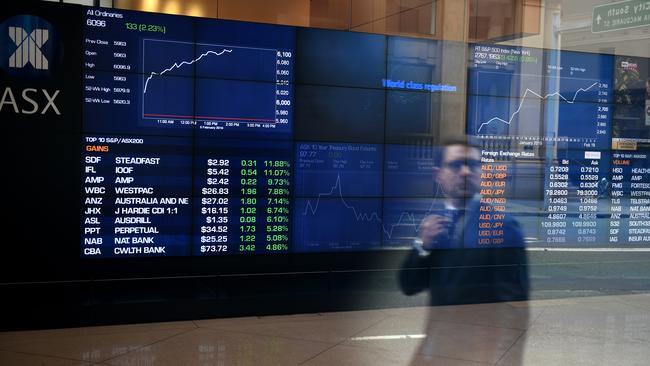
That’s all from the Trading Day blog for Monday, October 26. Australian stocks closed 0.2pc lower despite rising as much as 0.6pc during the session on takeover activity.
John Stensholt 8.03pm: No cheer for pubs
Six million Victorians are looking forward to the eventual opening up of shops, restaurants and other retail outlets, but Chris Morris says state government restrictions mean it isn’t worthwhile to open some of the most famous pubs in the state.
Morris, the founder of the share registry firm Computershare, also owns a string of pubs in Victoria and WA and tourism assets across Queensland, including a casino in Townsville.
The Victorian public have now been told by the state government that it will lift some Covid-19 restrictions and make it possible to visit a pub for a pint and chicken parma from Wednesday, even if there will be limits on how many patrons can be in certain spaces.
Lachlan Moffet Gray 7.33pm: Fitch places Crown Resorts on negative watch
Crown Resorts has been placed on negative watch by another ratings agency following a fortnight of controversy and a combative annual general meeting last week.
Fitch on Monday said it has changed its outlook on Crown’s BBB long-term issuer credit rating from “stable” to “negative” following poor performances by executives in front of a NSW Inquiry into the company and the regulatory intervention of two government agencies.
Last week, Moody’s announced it was placing Crown’s credit rating under review.
James Kirby 7.22pm: Signs of stress in the economy
Accumulating economic stress, which has been masked by government stimulus support, just broke the surface with an economy-wide surge in late payments.
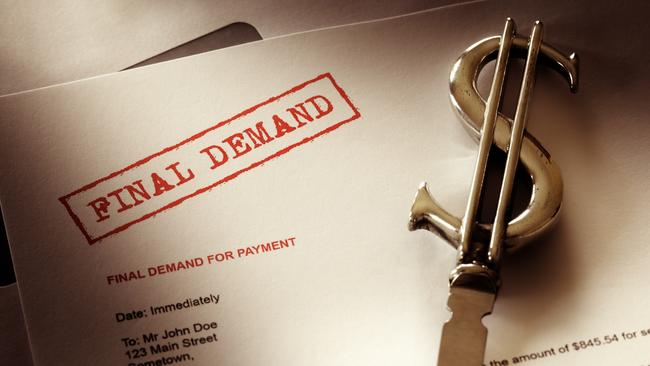
New data from credit agency Illion confirms the worst fears — that business operators, especially in small businesses, are finding it increasingly difficult to pay bills.
Following a recent string of surprisingly upbeat reports, including improved credit scores among Australian borrowers, the late payment figures go some way towards revealing the level of distortion brought about by JobKeeper and related support programs.
6.32pm: China stocks negative; HK closed
Mainland Chinese shares closed in negative territory Monday, in line with losses across Asia, while investors were keeping tabs on a policy meeting of the Communist Party this week.
The benchmark Shanghai Composite Index fell 0.82 percent, or 26.88 points, to 3,251.12, but the Shenzhen Composite Index on China’s second exchange added 0.52 percent, or 11.51 points, to 2,212.07.
Hong Kong’s market was closed for a public holiday
AFP
Cliona O’Dowd 5.45pm: Housing affordability ‘best’ for a decade: Moody’s
Housing affordability is at its best level in more than a decade and will improve further over the coming year thanks to low interest rates and falling house prices, according to Moody’s Investors Service.
The boost to affordability will come despite household incomes taking a hit as coronavirus-related government support measures peter out, the credit rating agency predicted on Monday.
For new home loans issued in September, households with two income earners were shelling out 23 per cent of their monthly earnings on mortgage repayments, Moody’s said. This was down from 25.1 per cent a year earlier.
The last time housing in Australia was this affordable was in March 2009, in the aftermath of the global financial crisis.
“We expect low interest rates for the foreseeable future and lower housing prices over the next 12 months, further improving housing affordability.
“Conversely, household incomes will come under pressure in coming months as coronavirus-related government income support measures end, but in respect of housing affordability, we do not expect this to outweigh low mortgage interest rates and lower housing prices,” the ratings agency said.
Affordability improved across all major capital cities in 2020, Moody’s vice president Alena Chen said.
“Housing affordability improved in Sydney, Melbourne, Brisbane, Perth and Adelaide over the year to September.
“For all capital cities, housing was the most affordable or near the most affordable in a decade in September,” she said.
4.35pm: Stocks slump to lowest close in two weeks
Australia’s share market finished down 0.2pc at 6155.6, its lowest daily close in two weeks.
After rising as much as 0.6pc to a 4-day high of 6206.5 on takeover activity, the index succumbed to relatively sharp falls in S&P 500 futures and commodities as much-needed US fiscal stimulus continuedto be delayed before the US election.
CC-Amatil rose 16pc to $12.50 after Coca-Cola European launched a $9.28bn bid at $12.75 a share and Link Administration rose 0.8pc to $4.94 after Carlyle and PEP revised up their offer to $5.40 a share or $2.87bn.
In what may be a positive sign for banks, Westpac only fell 0.4pc after disclosing $1.22bn of writedowns and provisions for its second-half results next month.
But despite some easing of mobility restrictions in Victoria, all the banks lost ground after recent gains, with NAB down 1pc.
The other major drags were the Materials, Tech and Consumer Discretionary sectors.
While the energy sector rose despite a further slide in WTI crude oil futures, iron ore miners succumbed to falling iron ore prices.
But BHP and Rio Tinto fell 0.8pc1.2pc as Dalian iron ore futures fell 2.9pc after the spot iron ore price dived 3.5pc to $US115.55 on Friday.
Aristocrat fell 1.7pc, while Afterpay lost 1.3pc as US BNPL company, Zebit, debuted with a 30pc fall to $1.045.
The Australian dollar was 0.38 per cent weaker against the US dollar by the close of the ASX session, trading around US71.12c.
Lachlan Moffet Gray 4.29pm: Adairs shares drop despite sales uptick
Shares in homewares retailer Adairs dropped by more than 5 per cent on Monday despite the company unveiling a total sales increase of 22 per cent through this financial year ahead of its annual general meeting.
The company told the market that in the 17 weeks to October 25, sales remain elevated across all channels, despite 43 stores in the Melbourne area being affected by renewed coronavirus lockdowns.
As a result, sales in physical Adairs stores shrunk by 0.6 per cent – but the decline was more than offset in the Adairs online division, which saw sales increase by 134 per cent.
After adjusting for the Melbourne closures, store sales on a like-for-like basis grew by 17 per cent. Sales at the newly-acquired Mocka online furniture store, purchased for $75m last December, grew by 48 per cent.
Overall, online sales now account for 41 per cent of total group sales. Speaking at the AGM, chairman Michael Butler said that Adairs benefited “significantly” from the COVID-19 driven surge in online shopping.
“We have been fortunate. While COVID-19 has caused significant damage to many industries – some of which may take years to fully recover – it is clear that many people continued to shop online and that the Home category was front of mind in their shopping,” he said.
Adairs shares closed 5.7 per cent lower at $3.64 each.
3.55pm: Owner of alleged fraudulent businesses arrested
The Federal Court has suspended the websites of two suspected fraudulent investment businesses and frozen all associated bank accounts, following an ASIC investigation which alleges Maxwell Financial Services and Asset Capital Holdings operated without the necessary financial services licences.
The corporate watchdog also alleges that a significant amount of money raised from retail investors had been dissipated.
Matthew Alan Beresford, who established Maxwell Financial Services and Asset Capital Holdings, has been arrested and charged, and the Federal Court has made orders to restrain him from leaving the country. The matter is listed for a further hearing in February.
3.20pm: ASX turns down as miners fall
Australia’s share market has turned down slightly amid falls in US stock index futures and commodity prices after a solid intraday rise on the back of takeover activity.
The S&P/ASX 200 was down 0.1pc at an intraday low of 6162.8 after rising 0.6pc to a four-day high of 6206.5.
The materials, consumer discretionary and technology sectors were underperforming and the consumer staples, energy, communications, real estate and health care sectors were outperforming.
CC-Amatil was up 16pc at $12.46 after Coca-Cola European launched a $9.28bn bid at $12.75 a share and Link Administration was up 1.6pc at $4.98 after Carlyle and PEP revised up their offer for to $5.40 a share or $2.87bn.
In a positive sign for banks, Westpac was up 0.2pc after disclosing $1.22bn of writedowns and provisions for its second-half results next month, but NAB shares fell 1.2pc.
But while the energy sector rose despite a further slide in WTI crude oil futures, iron ore miners succumbed to signs of further weakness in iron ore prices as well as a 0.6pc fall in S&P 500 futures.
BHP and Rio Tinto fell 0.7pc and Fortescue fell 1.2pc as Dalian iron ore futures fell 2.9pc after the spot iron ore price dived 3.5pc to $US115.55 on Friday. Coking Coal also dived on Friday, down 4pc to $US105 a tonne.
3pm: Miners weigh on ASX amid lower iron ore, coal prices
Falls in iron ore and coal prices on Friday have weighed on the major miners in today’s trade, with BHP down 0.6 and Rio down 0.7 per cent, while Fortescue is down nearly 1.5 per cent.
Meanwhile Whitehaven is trading down 1.4 per cent and South32 is down 0.5 per cent.
The spot iron ore price dropped 3.5 per cent on Friday to $US115.55 a tonne on oversupply concerns. Seaborne coking coal prices continue to backtrack on China’s import restrictions on Australian coal, the spot price falling 4 per cent to $US105 a tonne on Friday.
“Iron ore port stockpiles in China lifted again last week and have now increased about 10 per cent since bottoming in late August,” said Commonwealth Bank mining and commodities research director Vivek Dhar.
“The (coal) restrictions have meant increased demand for domestic coke in China, which in turn, has pushed up coke prices and eroded margins for China’s steel mills.
“Lower steel mill margins has the potential to weigh on seaborne iron ore prices too.”
Stuart Condie 2.17pm: Afterpay’s new bank accounts to improve net margin: Citi
Afterpay’s net transaction margin could improve by 2% if 10% of customers in Australia and New Zealand used one its new bank accounts to fund their buy-now-pay-later purchases, Citi says.
The bank says Afterpay would benefit from lower processing costs and lower losses.
It also estimates a 1% margin increase from the linked debit card’s interchange revenue.
Citi views the rollout of additional services in the U.S. as the bigger opportunity in terms of processing cost savings and incremental revenue from debit cards.
However, it questions whether Afterpay has scale to compete with the likes of Square and Venmo.
Dow Jones Newswires
Rosie Lewis 2.04pm: Australia Post expenses scrutinised
Australia Post executives will have their personal expenses scrutinised and the government-owned organisation’s use of gifts and rewards will be investigated, as part of the inquiry into the purchase of Cartier watches worth nearly $20,000.
The inquiry’s terms of reference, published by the Department of Communications, says a yet-to-be-announced law firm will support the government’s investigation into Australia Post’s governance arrangements and corporate culture.
It will look at: “The proper use and management of public resources, in relation to gifts, rewards and expenses, including personal expenses of executives. The investigation will determine whether Australia Post has expended money ethically and acted in a manner expected of a government business enterprise.”
The inquiry will establish facts around the gifting of the Cartier watches to four senior Australia post employees for $19,950 and the role of then chair John Stanhope and stood aside chief executive Christine Holgate.
It will also consider whether there are other instances at the organisation “inconsistent with appropriate behavior for a government business enterprise that require further investigation” and whether the use of public funds and resources has been “efficient, effective, economical and ethical”.
Read more: Australia Post execs’ Cartier watches cost $19,950
Perry Williams 1.14pm: Ironbark valued at $9.2bn by Citi
The BP and Beach Energy-backed Ironbark gas project in Western Australia’s Carnarvon Basin may emerge as a better bet to supply the North West Shelf LNG plant over Woodside Petroleum’s Scarborough field, Citi said.
BP, operator of Ironbark, is expected to start drilling in the next few days after receiving approval from the national offshore regulator in July.
The prospect is targeting 15 trillion cubic feet of gas which if accurate would make it the largest undeveloped gas resource in Australia, ahead of Woodside’s Browse at 14tcf.
That equates to 10m tonnes of LNG annually should the Ironbark-1 well prove successful which is valued at $9.2bn on a gross unrisked basis by Citi or a 21 per cent internal rate of return based on an LNG price of $US7 per million British thermal units.
Ironbark has superior net present value over Scarborough due to its lower for longer production profile and is less risky given a lower breakeven LNG price.
“We think that a successful Ironbark would be the most competitive large field to backfill NWS LNG infrastructure. Compared to a field such as Scarborough, we think it would be in NWS JV’s best interests to process Ironbark,” Citi analyst James Byrne said.
The exploration permit is just 50km from existing NWS LNG infrastructure in which BP holds a one-sixth interest, potentially offering a route to market from 2026 should drilling to 5500 metres prove successful. BP’s partners are Cue Energy, Beach Energy and NZ Oil & Gas.
An Ironbark discovery would lock Woodside into having to build a second train for Pluto LNG to process Scarborough, Citi said. It argues Woodside should process Scarborough through the existing NWS plant rather than developing Pluto Train 2, easing pressure on its balance sheet.
John Durie 12.46pm: Marley Spoon shares plunge
Food service provider Marley Spoon’s share price has gone into free fall on the same day as the company said it had successfully raised $56 million at $3.22 a share.
The stock was trading down 16.4 per cent at $2.64 a share in early afternoon trade.
The company said last week earnings performance was strong but it also said founder Fabian Siegel would sell 750,000 shares at the offer price last week of $3.22 a share.
No explanation was available for the plunge in the share price.
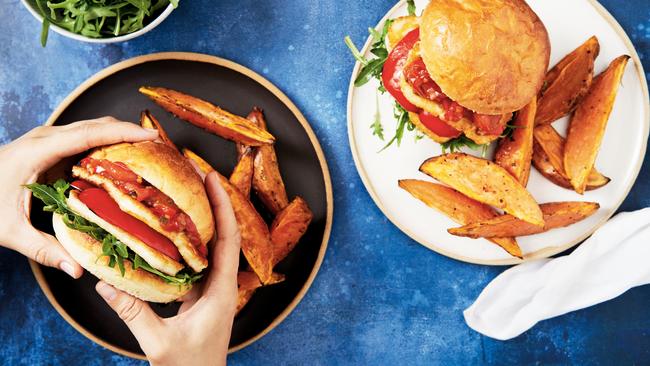
12.32pm: More banks offering cashbacks on refinanced loans
At least 29 lenders are now offering cashbacks of up to $4000 to homeowners looking to refinance their mortgage, more than double the number of cashback offers in February, according to analysis by comparison site RateCity.com.au.
While most cashback offers have historically been more expensive in the long term, banks are becoming more competitive in the refinancing market.
“The rise in refinancing is forcing banks to be more competitive than ever,” RateCity research director Sally Tindall said.
“Banks are increasingly offering sign-up specials on their lowest rate loans, making them far more competitive than they used to be.
“While a low ongoing rate typically trumps a sign-up special over the longer term, if you’re someone who refinances regularly, and knows how to drive a hard bargain on rate and fees, you could end up ahead in the first couple of years.
“Don’t just assume you’ll be better off with a cashback special. Do the maths yourself to work out if the whole package is going to put you ahead or leave you in the red.”
RateCity said that before refinancing for a cashback deal, homeowner should check that the rate is competitive and ask the lender to waive any high fees.
The latest ABS figures show that 137,372 loans were refinanced in the five months from April to August.
Eli Greenblat 12.21pm: Risk chief appointed at Woolworths
Woolworths has created a new role within the retail giant to reflect the increasing importance of risk governance and management across the group.
Woolworths said the role of chief risk officer has been created reporting to chief executive Brad Banducci.
David Walker, currently managing director of Woolworths general merchandise chain, BIG W, has been appointed to this role. He will have leadership of Woolworths Group’s critical risk and compliance functions within its accountability framework, the company said.
This includes primary responsibility for Woolworths risk and compliance strategy, the evolution of risk management frameworks and oversight of risk across the Group.
Mr Banducci said: “There are an ever increasing number of influences changing the way that we work and the role that we play in the communities in which we operate. Whilst this creates many new exciting opportunities for us, it also increases the importance of good risk management. To best reflect these needs, we have created a new Chief Risk Officer role within the Woolworths Group senior leadership team.”
Mr Banducci said For the last four years, Mr Walker and his leadership team have led the successful turnaround of BIG W by building a strong purpose-led culture that has culminated in the business’s return to profitability this year.
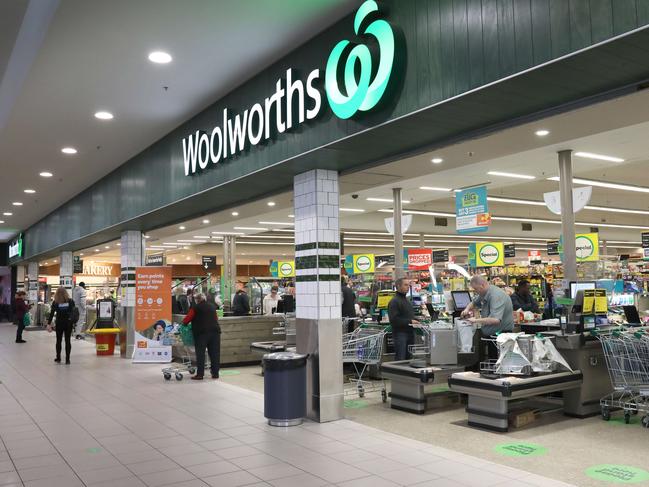
“David’s Customer 1st Team 1st mindset, his knowledge and experience leading our various businesses and operations and his background in finance and audit give him the ideal skills to step into this important new role for the Group.”
To replace him, Pejman Okhovat will join Woolworths as the new boss of BIG W.
Mr Okhovat joins from New Zealand where he was Chief Operating Officer, The Warehouse Group with an extensive background in non-food retail both in New Zealand and the UK.
He will join BIG W in the fourth quarter of fiscal 2021 and report to Claire Peters in her new Group role as managing director, B2B and Everyday Needs. In the interim, Teresa Rendo, who is currently general manager of Commercial at BIG W and has played a role in BIG W’s turnaround, will step in as acting managing director of BIG W.
12.06pm: Takeovers help lift ASX at noon
Australia’s share market remained higher at noon after hitting a four-day high, amid takeover bids.
The S&P/ASX 200 was up 0.3pc at 6185.6 after rising as much as 0.6pc to 6206.5, as Coca-Cola European Partners lobbed a $9.3bn bid for Coca-Cola Amatil and a private equity consortium upped its bid for Link Administration.
The Australian share market rose despite falls in US stock index futures, including a 0.4pc fall in S&P 500 futures.
Coca-Cola Amatil shares were up 15pc at $12.35 after hitting an 8-month high of $12.50 versus the recommended $12.75 cash bid from CCE, while Link was up 2pc at $5.00 after hitting $5.07 versus the revised $5.40 share bid from Carlyle and PEP.
The consumer staples and technology sectors were doing well on the back of those takeover bids with Woolworths up 0.8pc and Afterpay up 2.3pc as investors anticipate billions of dollars from these deals could be recycled back into the market.
Westpac was down 0.2pc, which was not a bad outcome considering its disclosure of $1.22bn in additional writedowns and provisions announced ahead of its 2H results next month. The banks sector index is breaking above its 200-day moving average.
But the resources sector remained vulnerable after sharp falls in bulk commodity prices including iron ore, coking coal and crude oil.
Fortescue fell 1.4pc, and Rio Tinto and BHP both fell 0.4pc, though Woodside rose 0.6pc even as WTI crude oil futures fell 1.3pc to $39.33 after falling 2pc on Friday.
Bridget Carter 11.41am: Credit Suisse tapped for Coke deal
Credit Suisse is believed to be financing Coca-Cola European Partners’ $9bn-plus bid for Coca-Cola Amatil.
More to come.
Perry Williams 11.31am: New Energy Solar puts farms up for sale
New Energy Solar has decided to sell its two NSW solar farms following a strategic review, blaming limited support for the listed renewables industry in Australia.
The ASX-listed company, which owns 14 solar projects in the US, plans to offload its 110 megawatt Beryl plant and 55MW Manildra facility in NSW after a review of its assets conducted by RBC.
Its Australian solar farms are in a “mature operational state” compared with its larger US portfolio which totals 606MW of capacity.
The company, owned by retail investors, listed at $1.50 in November 2017 but has shed 41 per cent of its value so far this year and was trading at 80c on Monday.
It noted a struggle to gain traction with institutional investors with a modest following from analysts and the location of assets in two very distinct markets.
RBC will launch a competitive auction for the Australian solar farms with indicative bids due in January. It aims to wrap up a deal by mid-2021.
The Australian’s DataRoom column reported on October 22 a US based fund was circling New Energy Solar ahead of the results of the strategic review.
11.22am: Citi cautious on US equities
Cit’s chief US equity strategist Tobias Levkovich is cautious on US equities because sentiment is too bullish and valuations are too high.
“Euphoria readings, while lower than in late August, continue to imply downside risk and our P/E bull’s eye also suggests poor returns,” he says.
With a variety of valuation metrics at the upper end of historical ranges, Mr Levkovish warns that it’s, “challenging to discern ‘attractive’ levels, though our normalized earnings yield gap work remains upbeat”.
A sharp recovery in EPS trends for 2H20 and next year and the heavier market cap weight of secular growth constituents versus history justifies, “a good chunk of recent index level appreciation”, and he sees further modest profit gains in 2022 as well.
However, he warns that it may be reflected already with plausibly higher corporate tax rates restraining the scope of upside potential.
Similarly, credit conditions argue for a mid-2021 durable economic turn but that’s eight months away and share prices have rebounded sharply in anticipation.
He sees commercial & industrial lending standards improving from very tight levels reported in August, supporting a more resilient recovery from 3Q21 by which time broad-based coronavirus vaccination may be occuring.
But with household equity exposure near 50-year highs as a percent of financial assets, he says it’s not clear who the incremental buyers are for stocks.
“With buybacks down and significant retail investor ownership of stocks, plus large foreign holdings that could ease in the case of a weaker dollar, identifying the new purchaser is difficult,” Mr Levkovich says.
“Arguably, M&A could step up in a “cheap” financing environment, but it is unclear if that would be enough, particularly as many deals are being done using equity versus cash.”
He has a year end target of 3,300 points and 3,600 for mid-2021, but says the bigger issue of value versus growth for portfolio positioning reigns as the most crucial one for fund managers.
“Many see low rates for the distant future sustaining the secular growth names and their valuations,” he says.
“Others perceive an inflection point next year for a variety of reasons including the lapping of coronavirus-related comps by 2Q21 and we suspect the latter group is on the right track even if the shift looks to be more skewed to January as opposed to the current quarter.”
Patrick Commins 11.09am: Victorian economy ‘going backwards’
Victoria’s restrictions are costing 1200 jobs and $100 million in lost activity every day they continue, the head of Treasury’s economic modelling team says.
Luke Yeoman made the comments during this morning’s Senate estimates meeting in Canberra.
“Clearly the Victorian situation is having a very significant impact on the economy,” Mr Yeoman said. “Victoria is going backwards while the rest of the country is going forwards.”
The second wave of COVID-19 cases in the state has left the labour force there worse than it was during the peak of the first wave in May, while the rest of the country over the past five months or so has recovered seven in 10 jobs lost during the initial national lockdown.
There is a “natural recovery happening through the rest of the country” that has been “stronger than anticipated”, Mr Yeoman said.
10.33am: Value of super withdrawals nears $35bn
More than 3.3 million Australians have dipped into their superannuation fund at least once as part of the federal government’s early release super scheme. About 1.3 million people have now made a repeat application.
According to the latest APRA figures, 25,000 applications were received by funds in the week ending October 18, of which 16,000 were initial applications and 9,000 were repeat applications.
A total of $34.4bn has now been paid out of Australia’s super system as part of the scheme.
10.24am: ASX rises in early trade
Australia’s share market rose solidly early Monday as takeover activity and a “buy-the-fact” reaction to writedowns and provisions from Westpac offset sharp falls in US futures.
The S&P/ASX 200 rose 0.5pc to a three-day high of 6199.2 as Coca-Cola Amatil jumped 15pc on a $9.28bn bid from Coca-Cola European and Westpac shares rose 0.6pc.
Link Administration shares remained in a trading halt after a private equity consortium increased its existing takeover bid to $5.40 a share.
Bulk commodity producers lost ground, with BHP down 0.3pc, Oil Search down 1pc and South32 down 0.7pc after iron ore, coking coal and oil prices dived on Friday.
10.10am: What’s impressing analysts?
Star Entertainment cut to Neutral: JPM
4DMedical started at Speculative Buy: Evans & Partners
Bluescope cut to Sell: Morningstar
CSR raised to Outperform: CS
Deterra started at Neutral: CS
Iluka cut to Neutral: CS
Premier Investments cut to Sell: GS
Seven Group cut to Neutral: GS
BlueScope price target 39pc to $16: MS
BlueScope price target raised 14pc to $16: Citi
Iluka raised to Buy: Citi
AG raised to Buy: Bell Potter
Mineral Resources raised to Buy: Bell Potter
Gold Road Resources raised to Buy: Bell Potter
9.54am: Zip buys search engine Uge
Zip Co has acquired Australian retail search engine Urge with the aim of integrating its product-search capabilities into its buy-now-pay-later product.
The Australian buy-now-pay-later provider said it will issue 432,516 shares worth $3 million as an up-front consideration for Sydney-based tech firm Urge Holdings. It said it could pay further performance-related considerations worth $5.5 million over the next 3.5 years, but did not say whether that was in cash or scrip.
Zip on Monday said the integration will start with its US QuadPay unit. It said Urge drives increased sales, reach and exposure for retailers.
Zip also said its co-founders’ base salaries and long-term incentives were being raised after a review established they were being paid significantly less than their peers.
Shares last traded at $6.74, up 90pc in 2020.
Dow Jones Newswires
Patrick Commins 9.49am: Massive budget spend ‘proportionate’
Treasury secretary Steven Kennedy says the cost of debt is so low that the massive spending and borrowing undertaken in the budget is “unprecedented” but affordable and “proportionate”.
Speaking to an estimates commitee, Dr Kennedy went on to say “in the middle of a once in a century pandemic, there is no set and forget on fiscal policy”.
“Debt has risen significantly, (but) there is still ample room for the government to respond if the conditions deteriorate significantly,” he said.
But Dr Kennedy also said that “‘in the longer term balanced budgets serve governments well” as they reinforce to politicians that there are inevitably “trade-offs” involved with fiscal decision making.
He said Treasury’s advice to the government has been based around pursuing a “full employment objective”, which his department estimates at 4.75-5pc.
The department forecasts unemployment will peak at 8pc by the end of this year.
“No one is pleased to see the unemployment rate higher, but that would be a relatively successful outcome versus the 1980s and 1990s recessions,” Dr Kennedy said.
He noted that the budget estimated without government spending measures the unemployment rate would have peaked at 12pc and stayed that high for two years.
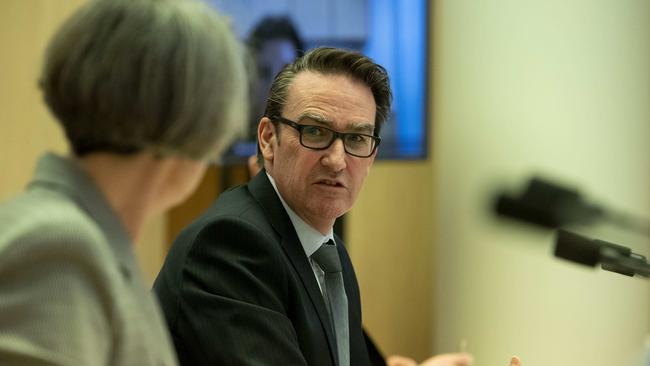
Bridget Carter 9.45am: Carlyle-PEP in new Link offer
The Carlyle Group and Pacific Equity Partners have put forward a new offer for Link Administration Holdings after its earlier $2.8 billion offer was rebuffed.
The new offer for all of Link, excluding its 44 per cent holding in Property Exchange Australia, or PEXA, is $3.80 per share or $5.40 per share for the whole company.
Its earlier offer was for $5.20 per share for the whole company, with investors having the option to take less cash and retain the PEXA stake.
The latest offer, the consortium says, implies that PEXA is worth between $5.87 and $6.28 per share.
This is based on statements from shareholders such as Yarra Capital that they believed PEXA was worth between $2.5 – $3.0bn.
The private equity firms now collectively hold a 14.62 per cent stake in Link Administration Holdings after earlier holding 9.65 per cent.
They said that the new offer would be withdrawn if they did not have access to due diligence materials by 5pm Wednesday.
It represents a 53.7 per cent increase to the average Link share price over 5 days.
It also equates to 10.5 times the company’s earnings before interest, tax, depreciation and amortisation.
The consortium argues that the deal offers a number of benefits including the likely need for a recapitalisation of Link once separated from PEXA.
9.38am: ASX tipped to rise, as CC Amatil fields offer
Australia’s share market will focus on the Coca-Cola Amatil takeover bid, Westpac’s writedowns and provisions, and falling bulk commodity prices, after modest gains on Wall Street.
Friday night futures relative to estimated fair value suggest the S&P/ASX200 will open up 0.4pc at a three-day high of 6192 after the S&P 500 rose 0.3pc to 3465.4.
But since then, Coca-Cola European has launched a takeover bid for CC Amatil at a 19pc premium of $12.75 a share in a deal worth $9.23bn, and Westpac has announced writedowns and provisions worth $1.22bn in its 2H results.
The scale and completely unexpected nature of the CC Amatil takeover bid makes it a significant positive as much of the money would be recycled locally, boosting consumer staples sector valuations.
It also means the market won’t have to make room for a CC-Amatil capital raising to buy the Asahi beer and cider and Lion Diary assets.
The Westpac writedowns and provisions are large and intuitively negative for the share market.
But they might actually be viewed as getting the bad news out of the way, so that could allow the share price to rally.
While about a quarter the size of Westpac’s writedowns, it’s worth noting that NAB shares rose 0.6pc on Friday.
The S&P/ASX 200 Banks index has closed above its 200-day moving average in 4 of the past 5 days.
All of the majors bar CBA have made sustained breaks of their 200-DMA’s and have potential for “bull flag” patterns.
Bulk commodity prices are the main risk for the S&P/ASX 200, with spot iron ore down 3.5pc, coking coal down 4pc and WTI crude down 2.1pc on Friday.
Richard Gluyas 9.30am: ASIC deputy chair Crennan quits
ASIC deputy chairman and head of enforcement Daniel Crennan QC has resigned with immediate effect, leaving the conduct regulator’s senior leadership in disarray.
Mr Crennan, who is embroiled in a row over $70,000 in relocation costs despite receiving advice from the watchdog that his expenses were “consistent with ASIC policy”, tendered his resignation to Treasurer Josh Frydenberg on Monday.
“I had been intending to retire from my position in July 2021,” he says in a statement.
“However, in the current circumstances, I have decided that it is in the best interests of ASIC for me to resign now.
“I have therefore tendered my resignation to the Treasurer with immediate effect.”

Mr Crennan’s abrupt departure leaves ASIC’s key enforcement agenda in a state of limbo, with deputy chair Karen Chester parachuted into the role of acting chair after James Shipton stepped aside last Friday pending the outcome of an independent review of his expenses.
The chairman told the House economics committee that he would immediately vacate his post while the Treasury review examined $118,000 paid to KPMG for tax advice and a further $78,000 in fringe benefits tax.
The review is expected to be completed before the end of the year.
Eli Greenblat 9.28am: Ombudsman opposes Woolworths’ distributor acquisition
Australian Small Business and Family Enterprise Ombudsman Kate Carnell has written to the competition regulator to formally oppose Woolworths’ proposed $552 million acquisition of food distributor PFD Food Services.
The Ombudsman is urging the regulator to block Woolworths’ proposed $552 million purchase of a controlling interest (65 per cent) in PFD, saying the deal would be detrimental to small businesses in the food distribution space and the economy more broadly.
“Woolworths has described its push into the food services sector as a ‘strategic investment’ but the timing is opportunistic at best,” Ms Carnell said.
“Woolworths has been a beneficiary of COVID restrictions, with its supermarket operations seeing a significant upswing in sales, while independent food distributors have struggled.
“Now that Woolworths has exhausted opportunities in the large supermarket space, it is moving into the smaller supermarket arena. Allowing Woolworths to buy PFD would significantly improve its competitive position against other smaller supermarket operators. “Claims by Woolworths about plans to establish Chinese walls to prevent PFD passing on information about small supermarket competitors is questionable.”
Ms Carnell has written to the Australian Competition and Consumer Commission to oppose the acquisition.
“This deal would also dramatically impact on the food distribution market – many of which are small and family businesses – especially outside the major cities.
“Small food distributors are only now starting to get back on their feet after months of heavily restricted trade due to the forced closure of pubs, clubs and other commercial venues. To allow this deal to go ahead would be a real kick in the guts.”
Bridget Carter 9.11am: Nuix prepares for IPO
Nuix could lock in a price for its initial public offering as early as next week, with the software company believed to be working on a cornerstone process with prospective investors.
Next week, the company will also release analyst research that offers insight into the valuation of the company, which will coincide with a management roadshow.
Nuix is expected to list in the first week of December.
The company has so far proved to be attractive to institutional investors, subject to price, and now looks almost certain to be heading for a float through Morgan Stanley and Macquarie Capital rather than a trade sale, despite earlier buyer interest.
This comes as technology stocks remain in favour in the equities market amid the COVID-19 pandemic.
Earlier, private equity firms, including Kohlberg Kravis Robert, TPG Capital, Hellman and Friedman, Apax Partners and Vista Equity Partners had been looking at the business.
The global investigative analytics and intelligence software company, which is part-owned by Macquarie, is understood to generate $176m of annual revenue.
Expectations have been that Nuix will be looking for a price that equates to about 10 times its revenue.
Bridget Carter 9.05am: CC Amatil approved for Asahi deal
Coca-Cola European Partners is believed to be giving Coca-Cola Amatil the green light to go ahead with the acquisition of the Asahi beer brands should it wish to proceed, according to sources.
It comes after Coca-Cola Amatil confirmed that the European soft drinks giant had lobbed a $12.75 per cent takeover bid for the business, equating to a market value of just under $9.3bn.
Its shares last traded at $10.75.
Coca-Cola Amatil has been in the final stages to buy the beer brands Stella Artois and Beck’s from Japanese drinks giant Asahi, with adviser Macquarie Capital on board.
Asahi needs to sell some beer and cider brands to appease the Australian Competition and Consumer Commission.
Coca-Cola European Partners has had less of a presence in the alcohol market and market experts believed it may not be keen for Coca-Cola Amatil to pursue such a deal.
However, the understanding is that Coca-Cola European Partners will pursue Coca-Cola Amatil regardless of an Asahi purchase.
Asahi is advised by Rothschild and a conclusion of that sale process is believed to be imminent.
9.01am: CC Amatil hails improved conditions
Coca-Cola Amatil says trading conditions “continued to improve” in the third quarter, with revenue down just 4.2 per cent on the previous corresponding quarter.
That was an improvement compared to the 9.2 per cent revenue decline the company unveiled in its half year results announcement.
Meanwhile group volume was down 5.4 per cent on the same quarter a year ago, an improvement on the 11.6 per cent decline reported at the half year.
“It is pleasing to report that we are seeing earnings momentum return in markets where COVID-19 trading restrictions have eased, including continued recovery in ‘On-the-Go’ channels,” managing director Alison Watkins said in a statement to the market.
“This has particularly been the case in Western Australia and New Zealand which have both delivered growth in the third quarter, providing insight on the expected shape of the recovery that can be expected in other markets most notably in other Australian states where restrictions have been slower to ease.”
The trading update came as the company confirmed London-listed Coca-Cola European Partners was considering a takeover bid for the Australian beverage group.
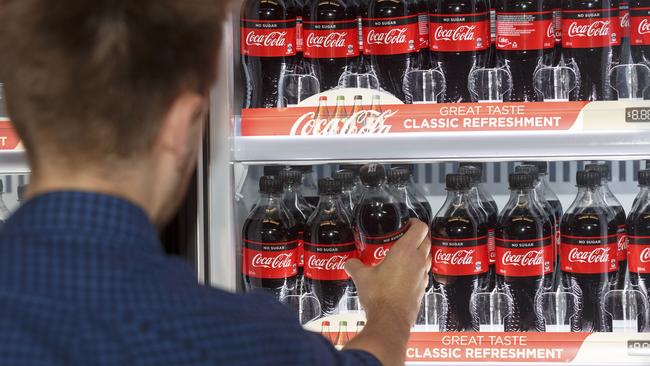
Bridget Carter 8.50am: Infratil consortium buys Quadrant’s Qscan
A Morrison-led consortium has purchased Quadrant Private Equity’s Qscan Radiology Clinics business for a price that takes its value to $735 million, including debt.
Included in the consortium is the New Zealand and Australia-listed infrastructure investor Infratil, which uses Morrison as its manager.
Morrison was first tipped to win the contest by DataRoom on October 13.
Infratil confirmed the acquisition to the market on Monday.
It fought off competition in the final stages by Ramsay Health Care and, earlier, by Permira and Queensland Investment Corporation.
Morrison is expected to target the healthcare sector for further acquisitions in the months ahead and recently hired Mark McArdle, who previously worked for QIC with a focus on the healthcare sector.
It was advised by E&P Corporate Advisory on the transaction.
Infratil raised $NZ300 million of equity in June 2020 which will help to fund the acquisition.
Qscan, advised by Stanton Road Partners and CLSA, describes itself as a leading diagnostic imaging provider, operating at least 70 clinics with more than 100 radiologists and 730 staff.
It generates about $50m of annual earnings before interest, tax, depreciation and amortisation.
Most of its operations are in NSW and Queensland, with a number in regional locations.
Infratil said in a statement to the market that it would own 60 per cent of the business, while the Morrison & Co Growth Fund would own 15 per cent and the remainder owned by doctors and management.
The sale price equates to between 12.7 and 14.1 times its forecasted EBITDA range of $52m to $58m for the 2021 financial year.
8.46am: Karoon Energy names new CEO
Oil and gas exploration company Karoon Energy says Julian Fowles will take over as chief executive as founder and long-standing CEO Robert Hosking retires at the conclusion of the company’s annual general meeting next month.
“After an extensive and rigorous global search process, we are delighted Dr Fowles has agreed to join Karoon as its new chief executive officer and managing director,” Karoon chairman Bruce Phillips said.
“Julian is a highly experienced petroleum industry executive who has had a successful international career with Shell International, Cairn Energy, Petra Energia and Oil Search.
“Julian’s deep upstream experience in international leadership roles, including CEO experience in Brazil, and company building success will be of great benefit to Karoon as it transitions from a pure exploration company into a profitable E&P entity.”
Dr Fowles will relinquish two non-executive director positions in other ASX-listed companies to concentrate on the new role.
“I am looking forward to the opportunity to lead Karoon Energy at this exciting time for the company as it seeks to consolidate the acquisition of the Baúna asset and in the next phase of its growth as a substantial oil and gas production company,” he said.
Karoon has exploration projects in Australia, Brazil and Peru.
8.00am: Coca-Cola Amatil confirms 9.3bn offer
Coca-Coca Amatil says it has received a $9.3bn takeover offer from the London-listed Coca-Cola European Partners.
It says the non-binding indicative proposal of $12.75 cash per share is for independent
shareholders by way of a scheme of arrangement. The Coca-Cola Company’s shares in
Amatil are proposed to be acquired by Coca-Cola European Partners separately, on less favourable terms.
Coca-Cola Amatil said directors intended to unanimously recommend the proposed scheme,
subject to conditions.
The offer, flagged by The Australian, is set to be the biggest takeover of an Australian company this year, with an equity value of $9.28bn.
Amatil chairman Ilana Atlas said “it is now in the best interests of independent shareholders to allow CCEP to undertake confirmatory due diligence and further negotiate transaction documentation in order to determine if a binding proposal can be presented to independent shareholders.”
Subject to due diligence and conditions, the board intended to unanimously recommend the scheme to independent shareholders.
The parent company, The Coca-Cola Company, is a major shareholder in both the suitor and the target as well as being the owner of their core beverage brands.
Coca-Cola Amatil is the local distributor of soft drink brands such as Fanta, Sprite and Lift, as well operating as a portfolio of beverages including Mt Franklin water, Goulburn Valley juices, coffee, dairy and beer.
7.36am: Westpac to take $1.22bn second half hit
Westpac says $1.22 billion of exceptional items, including a writedown of its life insurance services business, will drag down its second-half cash earnings.
The items include combined post-tax writedowns of $568 million of goodwill and intangibles associated with Westpac Life Insurance Services, the company’s Auto Finance business and capitalised software.
Westpac said it would also lift the provision and costs from a civil case related to the biggest breach of the Australia’s money-laundering and terrorism financing laws in history by $415 million. This includes $404 million in provisions associated with its recent $1.3 billion settlement with Australia’s financial-intelligence agency AUSTRAC that had previously been announced.
The lender also said it is increasing provisions for customer refunds, repayments, associated costs, and litigation provisions of $182 million after tax.
Asset sales and revaluations would reduce cash earnings by $55m after tax.
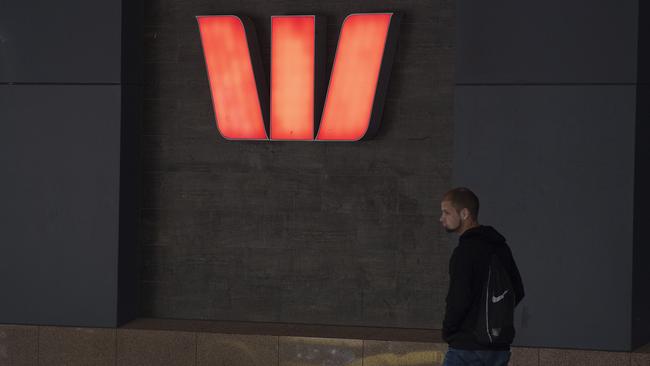
Dow Jones
7.00am: Tasmania remains top economy: CBA
Tasmania remains Australia’s best performing economy, with the ACT climbing to second and Victoria falling further behind, according to the latest CommSec State of the States report.
For the first time, Tasmania has topped the rankings for the third consecutive quarter and leads on five of the eight indicators.
The ACT economy has now lifted to second position with Victoria slipping to third.
NSW shares equal fourth spot with South Australia. Queensland, Western Australia and the Northern Territory are joint sixth.
6.20am: Stocks set for positive start
Australian stocks are poised to open higher, after a mixed session on Wall Street.
At 5am (AEDT) the SPI futures index was up 18 points.
On Friday, Australian stocks closed slightly lower after Wall Street rose, and investors focused on a new US stimulus package.
On Friday, on Wall Street, the benchmark Dow Jones Industrial Average closed down 0.1 per cent, the S&P 500 rose 0.3 per cent and the Nasdaq ended 0.4 per cent higher.
In the US this week, investor attention will remain on negotiations for a nearly $US2 trillion coronavirus-relief package, as the presidential election campaign moves into its final days. US earnings season is still in full swing, with technology companies that have powered the stock market higher due to report this week.
Ahead, in Australia, major banks are forecast to hand down full-year profits of around $11bn in the coming days, with ANZ kicking off the bank earnings season off on Thursday followed by Westpac and NAB next week.
The Australian dollar is higher at US71.39.
5.50am: Facebook prepares for election unrest
Facebook teams have planned for the possibility of trying to calm election-related conflict in the US by deploying internal tools designed for what it calls “at-risk” countries, according to people familiar with the matter.
The emergency measures include slowing the spread of viral content and lowering the bar for suppressing potentially inflammatory posts, the people said. Previously used in countries including Sri Lanka and Myanmar, they are part of a larger tool kit developed by Facebook to prepare for the US election.
Facebook executives have said they would only deploy the tools in dire circumstances, such as election-related violence, but that the company needs to be prepared for all possibilities, said the people familiar with the planning.
The potential moves include an across-the-board slowing of the spread of posts as they start to go viral and tweaking the news feed to change what types of content users see, the people said. The company could also lower the threshold for detecting the types of content its software views as dangerous.
Deployed together, the tools could alter what tens of millions of Americans see when they log onto the platform, diminishing their exposure to sensationalism, incitements to violence and misinformation, said the people familiar with the measures. But slowing down the spread of popular content could suppress some good-faith political discussion, a prospect that makes some Facebook employees uneasy, some of the people said.
Dow Jones
5.01am: Harley’s new CEO bets on leaner operations
Harley-Davidson is going back to the basics of making big, expensive motorcycles for its most devoted customers, abandoning a decadelong quest to reach new types of riders.
New Chief Executive Jochen Zeitz, a German-born former head of Puma SE and collector of African art, is scaling back overseas expansions, shrinking Harley supplies in the U.S. and delaying or abandoning new models that were intended to appeal to younger riders.
It is a hairpin turn from the strategy pursued by his predecessor, Matt Levatich, who tried to expand into new markets with smaller motorcycles.
Mr. Zeitz has said Harley must cut expenses and make its motorcycles more desirable. He is cutting about 30 per cent of the models in the line-up and encouraging dealers to close some stores.
Harley’s workforce is getting smaller, too. The Milwaukee-based company has laid off 500 workers globally, or around 10 per cent of its workforce, and, according to people familiar with the matter, that group included some on product teams developing new motorcycle models. Mr. Zeitz also has brought in outsiders to run the finance, digital, marketing and merchandise departments.
The company is expected to post a year-over-year sales decline for its third quarter Tuesday, according to analysts, even with a coronavirus-related increase in demand for motorcycles.
Harley says the changes aren’t a response to the coronavirus pandemic. The health crisis has actually boosted demand for larger motorcycles from people seeking socially distanced recreation outdoors, just as Harley is putting fewer bikes out of its 37 models on the market.
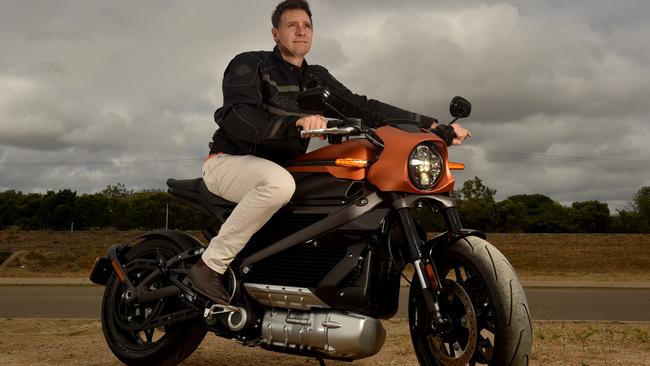
Dow Jones
4.45am: Brexit talks no closer to a deal: insiders
Britain and the European Union are still a long way from a post-Brexit trade deal, several European sources told AFP Sunday, as both sides prepared to resume talks this week.
“The negotiations are progressing, but we are still a long way off,” said one senior European official.
Talks are to continue in London until Wednesday, then in Brussels from Thursday, said another source.
But time is fast running out.
France’s Europe Minister Clement Beaune said last week that the EU wanted to wrap up the discussions by October 31 to leave enough time for parliamentary ratification across the bloc’s 27 member states.
AFP
4.45am: Samsung chairman Lee Kun-hee dies at 78
Samsung Electronics chairman Lee Kun-hee died at the age of 78 on Sunday, the company said.
Lee, who turned the South Korean firm into a global tech giant, was left bedridden by a heart attack in 2014.
“It is with great sadness that we announce the passing of Kun-hee Lee, Chairman of Samsung Electronics,” the company said in a statement.
“Chairman Lee passed away on October 25 with his family, including Vice Chairman Jay Y. Lee, by his side.” “Chairman Lee was a true visionary who transformed Samsung into the world-leading innovator and industrial powerhouse from a local business,” the firm said, adding: “His legacy will be everlasting.” Samsung is by far the biggest of the family-controlled conglomerates, or chaebols, that dominate business in South Korea, the world’s 12th-largest economy.
The company’s overall turnover is equivalent to a fifth of the nation’s gross domestic product, making it crucial to South Korea’s economic health.
His son, Samsung Electronics vice chairman Lee Jae-yong, has been at the helm of the company since the 2014 heart attack.
Lee was jailed for five years in 2017 after being found guilty of bribery and other offences linked to former president Park Geun-hye, before being cleared of the most serious charges on appeal and released a year later.
That case is currently being retried.
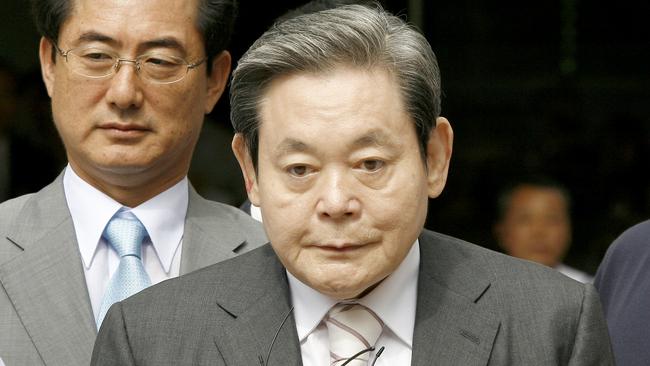
AFP
4.40am: Wall Street recap
Wall Street traders came to differing conclusions regarding the ongoing federal stimulus stalemate on Friday, with the Dow closing slightly lower but the S&P 500 and Nasdaq making gains.
At the close, the benchmark Dow Jones Industrial Average was 0.1 per cent lower at 28,335.57.
The broadbased S&P 500 rose 0.3 per cent to 3,465.39 while the tech-rich Nasdaq Composite Index closed 0.4 per cent higher at 11,548.28.
Traders have been closely following negotiations in Washington over passing a massive new stimulus bill to revive the world’s largest economy and Friday did not bring the breakthrough they’d hoped for.
Treasury Secretary Steven Mnuchin said “significant differences” remain with Democratic House Speaker Nancy Pelosi, saying “if she wants to compromise, there will be a deal.” Traders are also digesting a surge in coronavirus cases across the United States, with the expectation being that businesses won’t shut down again, said Karl Haeling of LBBW.
“Today is nothing more than a consolidation day,” Haeling said. “The market really wants to see a bill before the election,” but considering it didn’t drop considerably, Haeling said it’s possible “the market is looking through the next few months and thinking that there will be another stimulus package at least by March.” Shares of Gilead Sciences climbed 0.2 per cent after the US Food and Drug Administration gave full approval to its antiviral drug remdesivir as a treatment for patients hospitalised with COVID-19.
Dow member Intel closed 10.6 per cent lower and American Express fell 3.6 per cent on disappointing earnings.
Toymaker Mattel jumped 9.6 per cent after reporting a profit boosted by sales of its popular Barbie dolls.
AFP



To join the conversation, please log in. Don't have an account? Register
Join the conversation, you are commenting as Logout